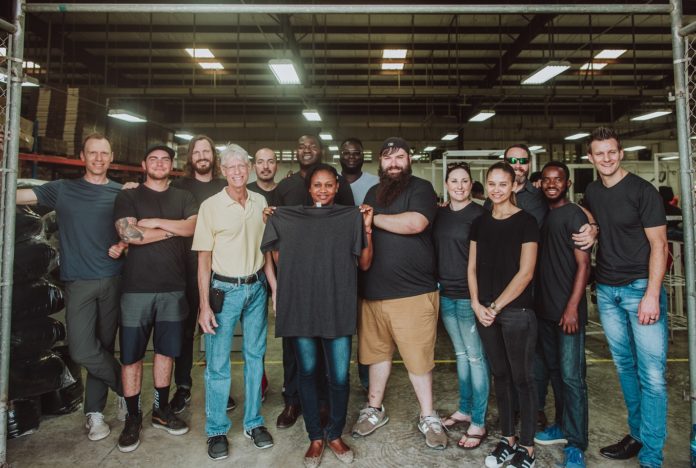
Many business owners are satisfied with simply making their businesses profitable. Ryan Moor, owner of Vancouver’s Ryonet, is going well beyond that – not only has Ryonet doubled its revenue since 2013, but the company is leading an industry sea-change that could have a similar effect on the garment industry as Starbucks had on the coffee industry.
Ryonet’s tagline is “powering the print.” In other words, the firm empowers creative entrepreneurship in screen printing through industry-leading education, service and support. Currently, Ryonet provides screen printing supplies and equipment around the world – a far cry from when Moor started his business in his mother’s kitchen. The company has acquired several screen printing manufacturers, and is now offering customers next-generation ROQ screen printing equipment from Europe.
“This equipment is more efficient, safe and environmentally-friendly,” said Moor. “It’s emerging technology that allows our customers to grow faster and print smarter. Think of it as the Tesla of screen printing presses – it has done wonders for our print shop business.”
Over the last few years, Moor has changed his business model to move up-market, and help his customers move up-market as well.
“We are offering more advanced production capacity, more efficiency and better yields, which attracts bigger customers,” said Moor.
Although the company’s team has stayed at about 100 people, the firm has added more customers through integration of technology such as the cloud-based NetSuite enterprise resource planning (ERP) platform. The technology has enabled Ryonet to use more third-party logistics (3PL) warehouses than before, stretching the company’s reach and market influence.
Speaking of market influence, Moor is passionate about the “Allmade” campaign (see Allmade.com). This initiative is allowing the firm to step behind “the print” and provide a garment worth printing.
“The garment industry is extremely commoditized,” he said. “Printers can buy a t-shirt for $1.50. It’s cheap because environmental concerns and people concerns have been taken out of the equation and the focus is only on price.”
Moor, along with 10 founding customers, want to change that.
“We want to create a mass-market product that competes but that is made differently, using environmentally-conscious fibers and supply chains, where people are paid their worth,” Moor said.
The initiative is starting in Haiti, paying five-times the local mass-market garment rate. Moor said that 90 percent of orphans in Haiti are not really orphans – their families simply cannot afford to raise them.
“We want to rebuild their economy, rebuild the family, and create hope and opportunity for future generations,” said Moor.
Moor said that his Allmade campaign is similar to the changes Starbucks initiated 30 years ago, when the billion-dollar coffee industry was all about low-end product with no value in the supply chain.
“Starbucks came along and created a different experience and charged for it differently,” explained Moor. “The coffee industry is now one of the most supply-chain-conscious industries where the end-user experience is amazing no matter who you buy it from. We hope to do the same thing for the garment industry.”
The key to success, stated Moor, is creating awareness. Most consumers, he said, are not aware that the “cotton” t-shirt they buy for their Little Leaguer or teenager is 30 percent chemicals by weight, or that fashion is the second-most polluting industry in the world.
“The U.S. consumes five to six billion shirts annually,” Moor said. “We want to help create change in the consumer market, where consumers themselves help make the world a better place by asking for Allmade products by name.”
Of course, Haiti is only a small corner of the world. Moor realizes that the journey won’t be made in a day. For example, he said, he wants “to continue the conversation about what ‘living wage’ means – even here in Clark County.”
“Making it work everywhere is a challenge we’re tackling now. We still need to be able to compete while paying double the wages everyone else is,” said Moor. “We must come up with technology and mechanisms to facilitate that.”
When he’s not globe-trotting on a mission to change the world and his industry, Moor enjoys spending time in the Pacific Northwest.
“This is a great place to find staff and a great place to live,” said Moor, adding that his staff apparently feels the same way: while only 60 percent of his staff lived here in 2013, now 90 percent are local. Local firms such as Key Bank, he said, have been great partners; the firm is also working with Trillium Employment Services, which helps businesses recruit, train and retain employees with disabilities, and with other organizations to address homelessness in our area.
“I encourage other companies to get involved,” said Moor. “Our youth that are homeless is something we have to figure out as a nation.”
From homeless people in his community, to orphans in Haiti, to fostering a transformative market shift in the garment industry, there’s no question that Moor is a power to be reckoned with.
“We’re excited about creating change in our industry and evolving from commoditization to value and creating a human-friendly product,” concluded Moor.
Ryonet
12303 N.E. 56th St., Vancouver
Founded 2004
Approx. 100 employees
www.screenprinting.com








